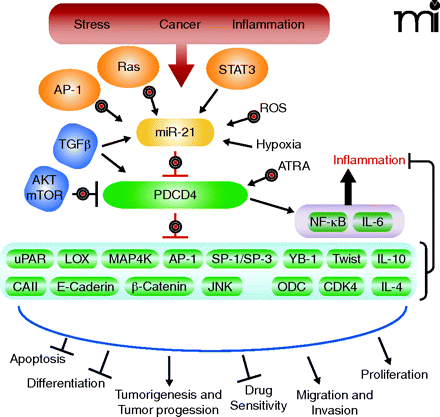
- Institution: Stanford Univ Med Ctr Lane Med Lib/Periodical Dept/Rm L109
- Sign In as Member / Individual
Have Tumor Suppressor PDCD4 and its Counteragent Oncogenic miR-21 Gone Rogue?

Therapeutic Targeting of miR-21 and PDCD4: Anti-Inflammatory vs Anti-Cancer. Deregulated miR-21activity occurs under many conditions, including stress, cancer, and inflammation. Although miR-21 expression is regulated by transcription factors such as AP-1 and STAT3, most miR-21 regulation takes place post-transcriptionally. miR-21 RNA expression is activated by TGFβ, reactive oxygen species (ROS), Ras, all-trans retinoic acid (ATRA), and hypoxia. PDCD4 translation is inhibited by miR-21 and PDCD4 is post-translationally regulated by AKT–mTOR–dependent proteasomal degradation. Direct (translationally regulated) targets of PDCD4, including carbonic anhydrase II (CAII) and IL-10, still need to be validated. Indirect targets (targets that appear to be pre-translationally regulated by PDCD4) include: urokinase receptor (uPAR), lysyl oxidase (LOX), mitogen-activated protein kinase kinase kinase kinase 1 (MAP4K), Twist1, Y-Box-binding protein (YB-1), E-cadherin, β-catenin, ornithine decarboxylase (ODC), cyclin-dependent kinase 4 (CDK4), and Jun N-terminal kinase (JNK). In addition, transcription factors AP-1, SP-1, and SP-3 are negatively regulated by PDCD4, whereas NF-κB is positively regulated by PDCD4. Increased expression of PDCD4 and decreased expression or availability of PDCD4 targets can lead to inhibition of proliferation, migration, invasion, tumorigenesis, and tumor progression. Increased expression of PDCD4 can also increase apoptosis, drug sensitivity, differentiation, NF-κB activity, and inflammation. Bulls-eye targets indicate possibilities for therapeutic intervention.


